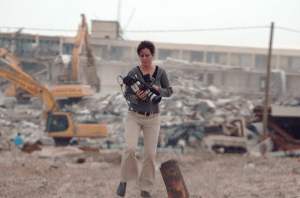
Our Community
 On April 20, 2010, the day BP’s oil rig exploded in the Gulf of Mexico, the Mississippi Gulf Coast community of Turkey Creek — which I had been making a documentary about for almost a decade — happened to appear on the front page of USA Today. The headline read “For Them, Earth Day Was Late In Coming,” and the article described how this community settled by emancipated slaves had built alliances with environmental advocates to protect the fragile ecology and rich culture of a place threatened by urban sprawl, industrial contamination and disaster. The article quotes Derrick Evans, the main character in my film, saying, “It shouldn’t have been so hard.” It was about to get much harder.
On April 20, 2010, the day BP’s oil rig exploded in the Gulf of Mexico, the Mississippi Gulf Coast community of Turkey Creek — which I had been making a documentary about for almost a decade — happened to appear on the front page of USA Today. The headline read “For Them, Earth Day Was Late In Coming,” and the article described how this community settled by emancipated slaves had built alliances with environmental advocates to protect the fragile ecology and rich culture of a place threatened by urban sprawl, industrial contamination and disaster. The article quotes Derrick Evans, the main character in my film, saying, “It shouldn’t have been so hard.” It was about to get much harder.
News of the explosion broke when I was in Mississippi on what I thought would be the final shoot of my documentary. Five years before, in the summer of 2005, I thought I was close to wrapping up the same film when Hurricane Katrina struck the Gulf Coast. The injustice and inadequate reporting I witnessed in the aftermath of the hurricane changed the way I thought about documenting social change.
As I continued to follow the Turkey Creek story into a new era, I worked with Gulf Coast community leaders and advocates to envision a resource that would allow them to tell their own stories, address underreported issues, and connect with each other. With support from the W.K. Kellogg Foundation, the Gulf Coast Fund for Community Renewal and Ecological Health, and the Producers Institute for New Media Technologies, the project evolved into what is now known as Bridge the Gulf, which provides technical assistance and a forum for community-based journalists and storytellers.
To mark the two-year anniversary of the oil disaster, Bridge the Gulf is releasing a series of interviews titled Troubled Waters: Voices from the Gulf Coast, Two Years into the BP Oil Disaster, which supplement a new report by Facing South/Institute for Southern Studies. The interviews with Gulf Coast community leaders, advocates and media makers were done in collaboration with the Institute for Southern Studies and the Gulf Coast Fund for Community Renewal and Ecological Health and provide vivid first-person accounts of the ongoing ecological, social, economic and public health impacts of the oil disaster. The testimonials represent the diversity of the region’s coastal communities – Native American, African American, Vietnamese American, Cajun – and the creative work being done by community-based organizations.
Meantime, I’m once again getting close to a final cut of the Turkey Creek film while tracking international news stories about Derrick Evans. Last week he traveled to London where he made a statement at the BP shareholders’ meeting, calling attention to the plight of his community and the region.
Leah Mahan
Leah Mahan is an independent documentary filmmaker who has won multiple awards including a nomination for Outstanding Directorial Achievement from the Directors Guild of America for SWEET OLD SONG (2002). In 2011 she was invited to attend the Sundance Institute Documentary Editing and Story Lab as a Fellow working on a rough cut of her current film, TURKEY CREEK, which will air on public television in 2013. Leah served as Co-Executive Producer of GAINING GROUND (2012), the soon-to-be-released sequel to her first film, HOLDING GROUND: THE REBIRTH OF DUDLEY STREET (1997).

Read the stories and hear the voices of social change leaders fighting for justice.